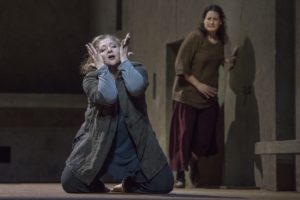THE HANGOVER REPORT – The Met revives its raw production of Richard Strauss’s ELEKTRA, ecstatically led by Christine Goerke and Yannick Nézet-Séguin
- By drediman
- March 5, 2018
- No Comments

Christine Goerke and Elza van den Heever in Richard Strauss’s “Elektra” at The Metropolitan Opera.
Tonight, I revisited the Metropolitan Opera’s raw production of Richard Strauss’s still-shocking, laser-focused one-act operatic adaptation of the Greek tragedy Elektra. Even if the staging from the late, great Patrice Chéreau this time around didn’t quite reach the devastating grandeur of when the production was new to the house two seasons ago – then featuring a career-defining performance from the great Swedish soprano Nina Stemme – the production remains an emotionally shattering experience, especially as ecstatically led by American soprano Christine Goerke and maestro Yannick Nézet-Séguin.
Ms. Goerke, inarguably one of the leading dramatic sopranos of her generation (she’ll unveil her Brünnhilde to Met audiences in next year’s Ring Cycle), made for an rousing, intense Elektra. Her instrument is plush and powerful, ably conveying the wide range of emotions spewed by the title character. Although I still prefer Ms. Stemme’s less overtly dramatic, more authentically tragic interpretation, Ms. Goerke nonetheless triumphed, as did excellent German mezzo-soprano Michaela Schuster and South African soprano Elza van den Heever as Klytämnestra and Chrysothemis, respectively. In particular, Ms. van den Heever’s penetrating, shimmering soprano proved to be a crowd-pleaser.
In the pit, Met Music Director Designate Nézet-Séguin yet again drew a superlative performance from the Met Orchestra. Like he did a few weeks ago with his superb reading of Wagner’s Parsifal, his Elektra was nuanced and detailed without losing the score’s innate shape and excitement. The piece’s fleeting lyricism were beautifully captured, while its thrilling climaxes proved to be edge-of-your-seat, blockbuster entertainment.
Mr. Chéreau’s production may initially come across as drab, but its ultimate point of view is powerfully made. The real tragedy, according to the this influential director, is Elektra’s inability to act as a woman. As she staggers about the stage in the thrilling final stretch of the opera, it’s both heartbreaking and harrowing to see her lumber about only to succumb to stasis among the other women trapped in the same helpless purgatorial state. A stunning, insightful tableau.
HIGHLY RECOMMENDED
ELEKTRA
Opera
The Metropolitan Opera
1 hour, 45 minutes (without an intermission)
Through March 23

 Copyright © 2024
Copyright © 2024
Leave a Reply